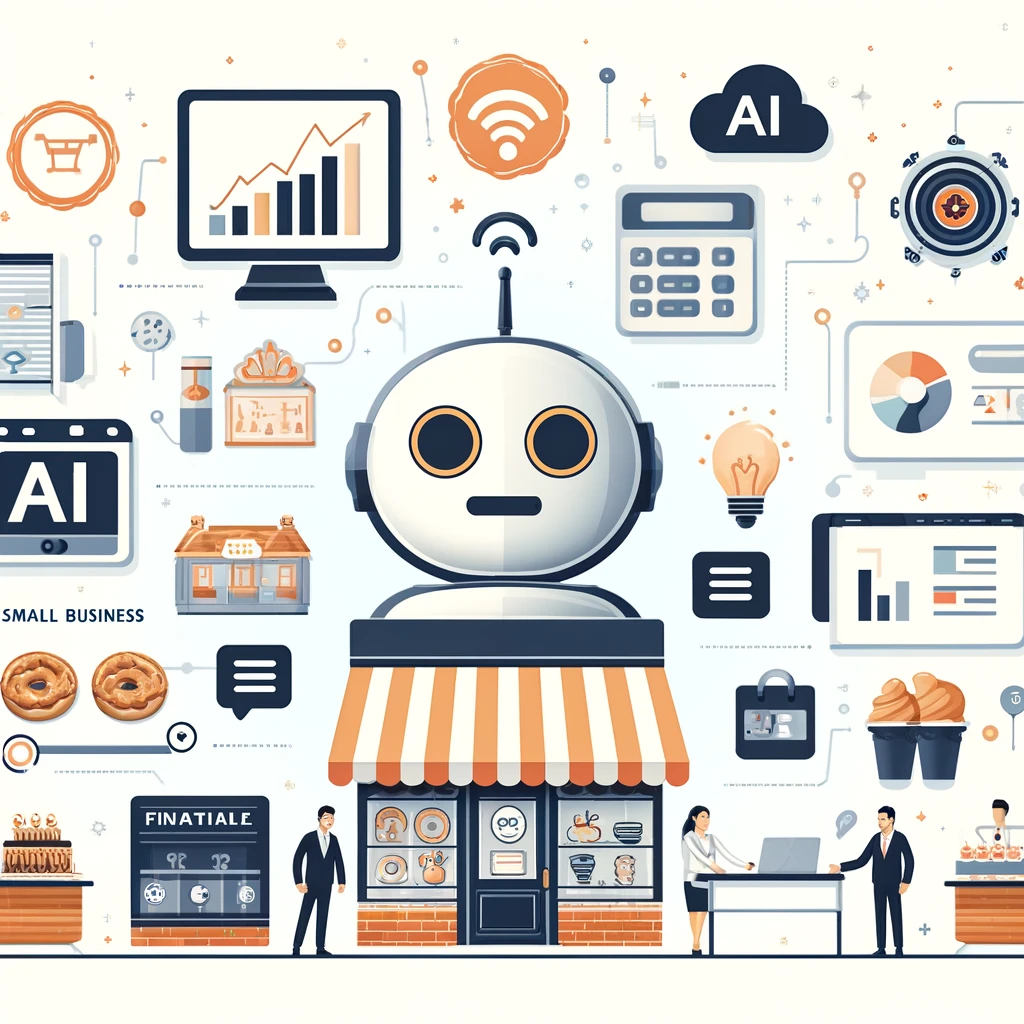Artificial Intelligence (AI) is no longer a luxury reserved for tech giants or large corporations. Today, small businesses have access to a growing range of affordable AI tools that can improve productivity, streamline operations, and enhance customer experiences. By adopting AI, small businesses can overcome resource constraints and compete effectively in their respective industries.
This article explores how small businesses can leverage AI to automate tasks, reduce costs, and optimize workflows for better results.
1. Why AI is Crucial for Small Businesses
Small businesses face unique challenges, such as limited budgets, stretched manpower, and the need to stay competitive in a fast-evolving market. AI offers solutions to these challenges by automating repetitive tasks, improving decision-making, and delivering data-driven insights.
Benefits of AI for Small Businesses
- Task Automation: AI handles time-consuming tasks like scheduling, data entry, and customer service, freeing employees to focus on strategic activities.
- Enhanced Customer Experience: Chatbots powered by AI provide instant responses, personalized recommendations, and 24/7 support.
- Smarter Decisions: AI tools analyze vast amounts of data to uncover trends, predict outcomes, and guide strategic decisions.
Why It Matters
AI levels the playing field for small businesses, enabling them to:
- Deliver personalized marketing campaigns.
- Optimize resources and reduce operational costs.
- Compete with larger companies by using similar tools at a fraction of the cost.
2. Affordable AI Tools for Automation and Productivity
The market is saturated with AI tools tailored to different functions. Here’s a detailed look at some of the most effective ones:
a. Task Management
- Trello with AI Integrations: Helps teams organize workflows, prioritize tasks, and provides actionable insights based on user habits.
- Notion AI: Combines task management with AI-powered writing and note-taking, making it easier to generate ideas and track progress.
b. Customer Service
- Zendesk with AI: Automates ticket management, uses chatbots to handle FAQs, and routes complex issues to the appropriate team.
- Tidio: A budget-friendly chatbot solution for small businesses, offering instant customer support and increasing engagement.
c. Marketing
- Canva with Magic Write: Speeds up graphic design and content creation, enabling small businesses to produce professional-quality social media posts and ads.
- Jasper AI: Creates compelling ad copy, email campaigns, and blog posts tailored to specific audiences, saving time on content creation.
d. Financial Management
- QuickBooks with AI Insights: Automates bookkeeping, expense tracking, and financial forecasting, reducing errors and improving accuracy.
- Wave: A free tool for invoicing and accounting, using AI to categorize expenses and provide financial insights.
e. Human Resources
- Zoho Recruit: Screens resumes and ranks candidates based on job descriptions, simplifying the hiring process.
- BambooHR: Automates payroll, tracks employee performance, and provides insights into team engagement.
3. How AI Boosts Efficiency in Small Businesses
AI not only reduces the burden of manual tasks but also improves accuracy, saves time, and enhances overall efficiency.
a. Reducing Errors
AI-powered tools ensure precision in areas prone to human errors, such as data entry, financial reporting, and inventory management.
b. Saving Time
Virtual assistants and automated schedulers reduce time spent on routine tasks, allowing small teams to focus on growth-oriented initiatives.
c. Enhancing Marketing Strategies
AI tools analyze customer data to predict behaviors, segment audiences, and personalize campaigns. Tools like Jasper AI and Canva can help craft high-impact marketing materials efficiently.
d. Boosting Customer Support
AI chatbots like Tidio provide round-the-clock customer service, resolving issues quickly and boosting customer satisfaction.
Example:
A small retail business used Tidio to handle over 70% of customer inquiries. This freed up staff to focus on in-store sales and led to a 25% increase in overall productivity.
4. Case Studies: Real-World Success with AI
Case Study 1: A Bakery Using AI for Inventory Management
A family-run bakery implemented AI to predict sales trends and manage inventory. By using tools like QuickBooks, they reduced waste by 30% and ensured popular products were always available.
Case Study 2: An E-Commerce Store Adopting Chatbots
An online retailer used Tidio to offer real-time support. The result was a 20% increase in customer satisfaction scores and a significant reduction in abandoned carts.
Case Study 3: A Marketing Firm Leveraging Jasper AI
A small digital agency adopted Jasper AI to produce content for clients. This allowed them to deliver projects 40% faster, enabling them to onboard more clients without increasing headcount.
Case Study 4: An Accounting Service Automating Financial Reports
An independent accountant integrated QuickBooks to automate data entry and reporting. This reduced their workload by 50%, allowing them to take on additional clients.
5. Overcoming Challenges in AI Adoption
Despite its benefits, implementing AI comes with hurdles. Here’s how small businesses can overcome them:
a. Initial Costs
Some AI tools require upfront investments. To address this:
- Start with free trials or freemium models to test value.
- Prioritize tools that align with your business needs and offer a measurable ROI.
b. Learning Curve
Training employees to use AI tools can be intimidating. Simplify the process by:
- Selecting user-friendly platforms with tutorials and customer support.
- Encouraging team collaboration to share knowledge and tips.
c. Data Privacy
AI tools often handle sensitive customer data. Ensure compliance by:
- Choosing platforms with robust security measures.
- Educating employees on data privacy regulations like GDPR or LGPD.
6. Future Trends in AI for Small Businesses
The role of AI in small businesses is set to grow, with advancements making the technology even more accessible and impactful.
a. Voice-Activated Tools
Voice recognition systems will simplify operations, enabling hands-free customer interactions and task automation.
b. Predictive Analytics
AI will provide more precise insights into customer preferences and market trends, helping businesses stay ahead of competitors.
c. Low-Code/No-Code Solutions
These platforms will empower small businesses without technical expertise to build custom AI applications, opening doors to new possibilities.
d. Advanced Personalization
AI will refine customer segmentation, enabling hyper-personalized experiences across marketing, sales, and support.
e. AI-Driven Sustainability
AI will play a role in helping businesses reduce waste, optimize energy use, and improve overall sustainability efforts.
How AI Transforms Small Businesses
AI is revolutionizing small businesses by automating tasks, enhancing customer service, and optimizing decision-making processes. This image illustrates the real-world applications of AI, from chatbots to financial tools, empowering businesses across industries to achieve greater productivity and innovation.

Conclusion
Artificial Intelligence is no longer a luxury; it is an essential tool for small businesses looking to thrive in today’s competitive landscape. By adopting affordable AI solutions, businesses can automate routine tasks, enhance customer experiences, and make data-driven decisions.
Whether it’s using Jasper AI to streamline marketing, Tidio to improve customer service, or QuickBooks to manage finances, small businesses have countless options to enhance productivity and efficiency. As AI technology continues to evolve, the opportunities for innovation will only grow, making now the perfect time to integrate AI into your operations.
With the right tools and strategies, small businesses can unlock their potential and achieve sustainable growth in a rapidly changing market.
Thank you for reading!
Enjoyed this article? We’ve got more content on this topic just for you. Check out our latest post in the same category and continue expanding your knowledge.
Read the next article and stay informed!






